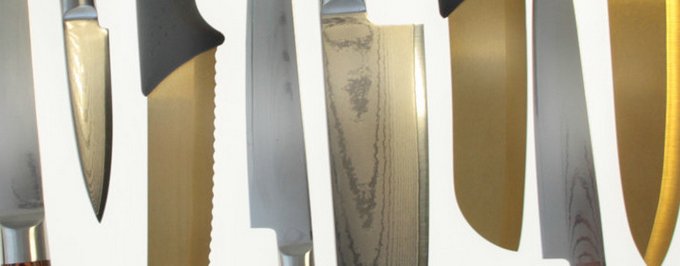Stainless steel knives
Stainless steel is a material that is frequently used to make domestic kitchen knives. They are typically made from a high-chromium, and whilst they must be frequently sharpened, they are highly resistant to corrosion. Carbon steel is a type of stainless steel that is commonly used in knives, as it is inexpensive and holds its shape well. It is easier to resharpen than most stainless steels, but it is vulnerable to stain and rust, and thus must be carefully cleaned, dried and lubricated after each use. Carbon steel is also likely to impart a 'metallic' taste to acidic foods, although over time and usage this may reduce as the steel acquires an oxidising patina that prevents corrosion.
Damascus steel knives
Damascus knives are made from a type of steel and have pattern welded blades. They are made out of hard steel while others a produced in simple layers that are actually too soft for practical, domestic use. Damask steel is the result of combining at least two different types of steel that harden together to produce their patterned effect, and the combination of the steels means that the knives are tough and resistant to shattering, whilst capable of being honed into a sharp and resilient edge.
The word 'Damascus' has romantic connotations, relating to the Damascus steel that was used in Middle Eastern sword making. These swords were characterised by their distinctive patterning and mottling that is said to resemble flowing water.
Ceramic knives
Ceramic blades are extremely hard, and can take a finely-honed sharp edge. They are able to retain this edge for a long time due to the nature of the ceramic, are lightweight and have a high durability. Because of their brittle nature, they are likely to chip if they are struck against a hard object or sharpened improperly, and require special ceramic blade sharpening tools. A ceramic knife does not impart any taste to food, and is non-corrosive and stain resistant.
Read about Advantages & Disadvantages with Ceramic Knives
Titanium nitride coated knives.
Titanium nitride coated knives are made from a very hard ceramic material that is often used as a coating to improve the surface properties of various softer metals. Titanium nitride is gold in appearance, and it non-toxic. It is applied as a thin coating to ceramic knives in order to harden and protect the knife. Because of its gold appearance it is sometimes also used for decorative purposes.
Conclusion
The different qualities of materials and knives will of course make a difference to the production of your food. In terms of choosing appropriate styles and features, it is probably best to consider the types of food that you most commonly prepare and choose your blades accordingly. It is always worth finding types of knives that will be hardwearing and unlikely to discolour or rust, and having a range of knives can also open up your culinary world as you begin to explore with different types of food preparation and ingredients. Most importantly, taking good care of a blade is a crucial part of any budding or professional chef's life.
